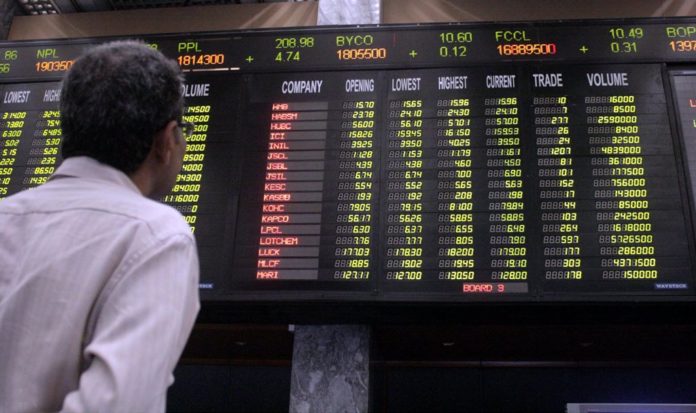PTBP Web Desk
Stock Exchange (PSX) experienced significant selling pressure on Tuesday, with its benchmark KSE-100 Index plummeting by nearly 1,400 points during intra-day trading. By 11:45 am, the index was recorded at 112,108.67, marking a decrease of 1,411.65 points or a 1.224% drop from its opening value. This downturn was prominently felt across several key sectors including oil and gas exploration companies, oil marketing companies (OMCs), power generation, refineries, and commercial banks.
Notably, energy stocks, which are significant contributors to the index, were trading in negative territory. Companies like HUBCO, MARI, OGDC, PPL, PSO, SHEL, SSGC, and SNGPL saw their shares decline, adding to the bearish sentiment in the market. The selling pressure in these sectors reflects not only local market dynamics but also a broader investor caution spurred by recent economic policy announcements.
The market’s mood was further influenced by the Monetary Policy Committee (MPC) of the State Bank of Pakistan (SBP) which, on the previous day, decided to reduce the key policy rate by 100 basis points to 12%. This was the sixth consecutive rate cut since June 2024, when the rate was at 22%. The MPC’s statement highlighted a continued downward trend in inflation, reaching 4.1% year-on-year in December, attributing this to moderate domestic demand and supportive supply-side dynamics.
The MPC anticipates further reduction in inflation in January before a slight uptick in the following months. However, despite the rate cut, which was expected to stimulate investment, the market responded with a sell-off, possibly due to investors cashing in on gains or due to broader economic uncertainties.
On the international front, the market’s performance was not isolated from global happenings. The tech sector globally faced a significant downturn, particularly after Nvidia, a leading chipmaker, saw its stock plummet by 17% overnight, leading to a colossal loss of nearly $593 billion in market capitalization – the largest single-day drop in history. This event triggered a ripple effect across tech-related stocks, with Nvidia’s suppliers and related companies like Japan’s Advantest, SoftBank Group, and Furukawa Electric also witnessing sharp declines in their stock prices.
In Asia, tech-heavy markets in Taiwan and South Korea were closed for a holiday, but the impact was felt elsewhere, with Australian data centre landlords also seeing their stocks tumble. The sell-off was not confined to Asia; it extended from Tokyo to New York, affecting a wide array of companies involved in the AI and tech supply chain, including power utilities and software firms.
The broader market sentiment was captured by the rise in the CBOE Volatility Index, known as Wall Street’s fear gauge, alongside a rally in safe-haven assets like government bonds, the yen, and the Swiss franc. This scenario suggests a cautious approach from investors globally, wary of potential overvaluation in tech sectors and the broader implications for the global economy.
Back in Pakistan, the PSX’s reaction post-MPC announcement and amidst these global cues could hint at a period of consolidation or further correction in the market. Investors might be reevaluating their positions, looking for stability signals either from domestic policy adjustments or global market trends.




